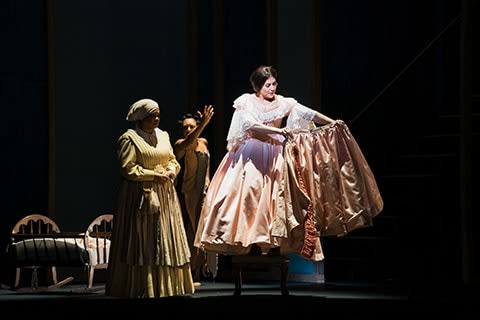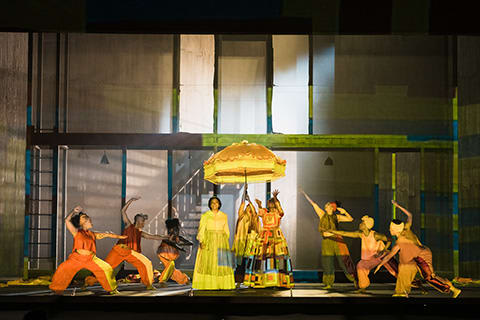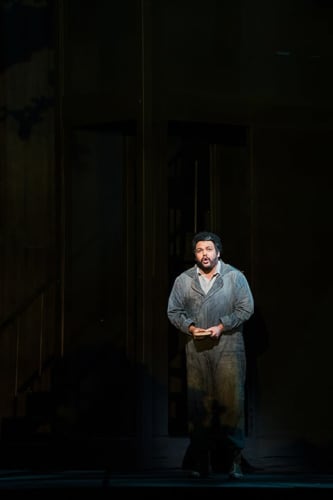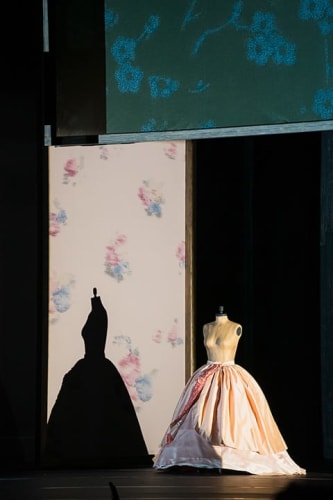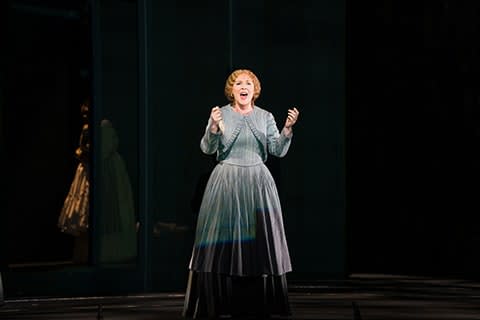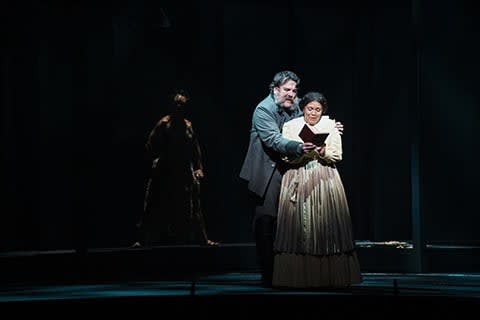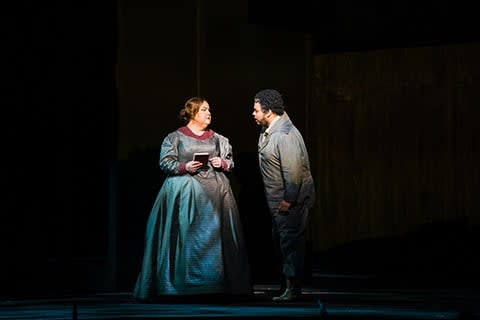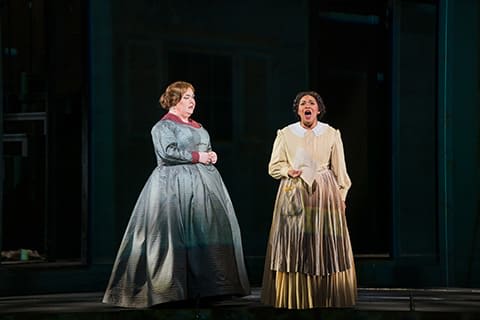First, an admission: I come to this conversation very late by review standards. Mea culpa, my own fault: I read the calendar wrong before talking to the Houston Grand Opera publicity folks and realized on Friday (when I saw Falstaff, which I have also reviewed) that I could also see Jake Heggie, Gene Scheer and Jawole Willa Jo Zollar’s world première production of their new opera, Intelligence, on Saturday. This usually requires attendance on opening night or, at least, second night to get out the news in time. But there I was in town, so I paid for my own ticket. It was that important for me to attend what I knew would be an important new opera. And I was right to do so.
Intelligence, with music by Jake Heggie, was written by the composer who also brought us Dead Man Walking (with a libretto by the late Terrence McNally) in a world première at the San Francisco Opera on October 7, 2000. Intelligence is Houston Grand Opera’s 75th commissioned opera. In my recent review of Falstaff, I mentioned that increasing racial diversity is one way to build new audiences; this is the second way. If you do not have enough racial, queer, or women’s representation on stage, commission operas that do. It takes a lot of money, but HGO has had a long history of such work and also of reviving long-forgotten operas, such as the through-composed version of Gershwin’s Porgy and Bess with its almost entirely black cast (the exception: two white policemen, the only two non-singing roles in the opera) and Scott Joplin’s 1911 Treemonisha, never really performed in his lifetime.
Porgy and Bess has received lots of performances since that production; Treemonisha has faded a bit since its revivals in the last decade beginning with that of the Atlanta Memorial Arts Center, Wolf Trap’s revival in 1972 and the HGO production way back in 1975, per an essay by Gunther Schuller found on the Library of Congress web site. I am pleased to say I have attended both operas in their HGO revivals.
In this case, Heggie, Scheer and Jawole Willa Jo Zollar have added to the tradition of operas reflecting the African-American experience, sadly one of incarceration, rape and death, as well as joy and faith and a desire for freedom, all still central to the lives of black folk today.
That influence of today is seen in the inclusion of dancers from the Urban Bush Women, which commented on the action through dance, including traditional African dress and choreography, and also an appearance of the First Lady of the Confederation and her white, white dress—which becomes a symbol both of white oppression and its privilege.
The story itself hinges on two meanings of the word that serves as the title of the opera, “intelligence”. It is both used in the sense of espionage and of two very smart women. Mary Jane Bowser is “loaned” (in context, a terrible word to use of a person who may or may not be free), to the Confederate White House by Elizabeth Van Lew, a white Southern woman who inherited slaves from her late husband and uses Mary Jane’s intelligence, depicted both in terms of common sense but also of literacy, the ability to read and write. This allows Mary Jane and Elizabeth to send military secrets back to the North. The Confederate leaders, here personified by Michael Mayes’s cruel and brutal Travis Biggs, know there is a leak, but since they are unable to conceive of a literate black slave, cannot figure out how it is happening.
All seven principal singers do great work: Lucinda (J'Nai Bridges) and Mary Jane (Janai Brugger) find that they are not just friends but related by a deep and terrible secret. Their scenes are powerfully effective and they sing Scheer’s words and Heggie’s music with beauty and passion. So too with Mary Jane and Jamie Barton’s Elizabeth Van Lew, her possible owner. And so too, as well, with sisters Elizabeth and Callie Van Lew (Caitlyn Lynch) who find themselves on opposite sides though they are both members of the Confederation.
Wilson (Joshua Blue), Mary Jane’s husband, part and parcel of a network getting slaves out of the Deep South, and Nicholas Newton’s Henry, a butler seeking only for a way out of the hellish situation in which he finds himself, finish out the cast. All do a wonderful job, though Travis Briggs’s character development relies a bit too much on Southern stereotypes such as Simon Legree, villain of Harriet Beecher Stowe’s Uncle Tom’s Cabin. A little less would have been helpful.
The music is rich and rises out of a great number of sources including American spiritual and, dare I say, American musical theatre. I swear I heard a reference to Fiddler on the Roof (“Sunrise, Sunset”, with an ascending musical line rather than the original’s falling line representing both the day’s passage and a lifetime’s marriage) with music by Jerry Bock, lyrics by Sheldon Harnick and book by Joseph Stein. I would think this unlikely if Fiddler were not itself embedded in a history of oppression: the flight of the Jews from the pogroms (“massacres”) of Eastern Europe. In that musical, America is the promised land. In Intelligence, it is the North, which did not prove to be as liberatory as the slaves who fled north had hoped, but better than those who remained during the Reconstruction.
And the set is a wonder, reminiscent of that of Evita, all shapes that flow and shift with projections that set the scene, the loveliest being the fine embroidery that the slaves produced with their hands and their skills and lack of compensation, projected on the walls.
If you read this review in time, get tickets. If not, I’m sure you will be able to in future productions at companies such as Lyric Opera of Chicago, Seattle Opera, Los Angeles and the Met. Go. This is likely to prove another standard work in the 21st century operatic repertory. Go.
